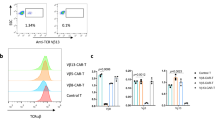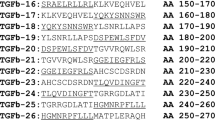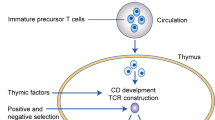Abstract
CD40 is essential in enabling antigen-presenting cells to process and present antigen effectively to T cells. We demonstrate here that when antibody against CD40 is used to treat mice with syngeneic lymphoma, a rapid cytotoxic T-cell response independent of T-helper cells occurs, with tenfold expansion of CD8+ T cells over a period of 5 days. This response eradicates the lymphoma and provides protection against tumor rechallenge without further antibody treatment. Thus, it seems that by treating mice with monoclonal antibody against CD40, we are immunizing against syngeneic tumors. The phenomenon proved reproducible with two antibodies against CD40 (3/23 and FGK-45) in three CD40+ lymphomas (A20, A31 and BCL1) and gave partial protection in one of two CD40– lymphomas (EL4 and Ten1). Although the nature of the target antigens on these lymphomas is unknown, CD8+ T cells recovered from responding mice showed powerful cytotoxic activity against the target B-cell lymphoma in vitro.
This is a preview of subscription content, access via your institution
Access options
Subscribe to this journal
Receive 12 print issues and online access
$209.00 per year
only $17.42 per issue
Buy this article
- Purchase on Springer Link
- Instant access to full article PDF
Prices may be subject to local taxes which are calculated during checkout





Similar content being viewed by others
References
Grewal, I.S. & Flavell, R.A. CD40 and CD154 in cell-mediated immunity. Annu. Rev. Immunol. 16, 111– 135 (1998).
Noelle, R.J., Ledbetter, J.A. & Aruffo, A. CD40 and its ligand, an essential ligand-receptor pair for thymus-dependent B-cell activation. Immunol. Today 13, 431–433 (1992).
Soong, L. et al. Disruption of CD40-CD40 ligand interactions results in an enhanced susceptibility to Leishmania amazonesis infection. Immunity 4, 263–273 (1996).
Campbell, K.A. et al. CD40 ligand is required for protective cell-mediated immunity to Leishmania major. Immunity 4, 283– 289 (1996).
Kamanaka, M. et al. Protective role of CD40 in Leishmania major infection at two distinct phases of cell-mediated immunity. Immunity 4, 275–281 (1996).
Stout R.D. et al. Impaired T cell-mediated macrophage activation in CD40 ligand-deficient mice. J. Immunol. 156, 8– 11 (1996).
vanKooten, C. & Banchereau, J. Functions of CD40 on B cells, dendritic cells and other cells. Curr. Opin. Immunol. 9, 330–337 (1997).
Ridge, J.P., Di Rosa, F. & Matzinger, P. A conditioned dendritic cell can be a temporal bridge between a CD4+ T-helper and a T-killer cell. Nature 393, 474–478 (1998).
Bennett, S.R.M. et al. Help for cytotoxic-T-cell responses is mediated by CD40 signalling. Nature 393, 478–480 (1998).
Schoenberger, S.P. et al. T-cell help for cytotoxic T lymphocytes is mediated by CD40-CD40L interactions. Nature 393, 480– 483 (1998).
Ferlin, W.G. et al. The induction of a protective response in Leishmania major-infected BALB/c mice with anti-CD40 mAb. Eur. J. Immunol. 28 , 525–531 (1998).
Dullforce, P., Sutton, D.C. & Heath, A.W. Enhancement of T cell-independent immune responses in vivo by CD40 antibodies. Nature Med. 4, 88–91 (1998).
Dilloo, D. et al. CD40 ligand induces and antileukemia immune response in vivo. Blood 90, 1927– 1933 (1997).
Schultze, J.L. et al. Autologous tumor infiltrating T cells cytotoxic for follicular lymphoma cells can be expanded in vitro. Blood 89, 3806–3816 (1997).
Schultze J.L. et al. CD40-activated human B cells: an alternative source of highly efficient antigen presenting cells to generate autologous antigen-specific T cells for adoptive immunotherapy. J. Clin. Invest. 100, 2757–2765 (1997).
Kato, K., Cantwell, M.J., Sharma, S. & Kipps, T.J. Gene transfer of CD40-ligand induces autologous immune recognition of chronic lymphocytic leukemia B cells. J. Clin. Invest. 101, 1133–1141 (1998).
Cardoso, A.A. et al. Ex vivo generation of human anti-pre-B leukemia-specific autologous cytolytic T cells. Blood 90, 549– 561 (1997).
Tutt, A.L. et al. Monoclonal antibody therapy of B cell lymphoma: signaling activity on tumor cells appears more important than recruitment of effectors. J. Immunol. 161, 3176– 3185 (1998).
Hasbold, J. et al. Properties of mouse CD40: cellular distribution of CD40 and B cell activation by monoclonal anti-mouse CD40 antibodies. Eur. J. Immunol. 24, 1835–1845 (1994).
Rolink, A., Melchers, F. & Andersson, J. The SCID but not the RAG-2 gene product is required for S mu-S epsilon heavy chain class switching. Immunity 5, 319–330 (1996).
von Herrath, M.G. et al. CD4-deficient mice have reduced levels of memory cytotoxic T lymphocytes after immunization and show diminished resistance to subsequent virus challenge. J. Virol. 70, 1072– 1079 (1996).
Cardin, R.D., Brooks, J.W., Sarawar, S.R. & Doherty, P.C. Progressive loss of CD8+ T cell-mediated control of a γ-herpesvirus in the absence of CD4+ T cells. J. Exp. Med. 184, 863–871 (1996).
George, A. J.T. et al. Anti-idiotypic mechanisms involved in suppression of a mouse B cell lymphoma, BCL1. J. Immunol 138, 628–634 (1987).
Hurwitz, A. et al. CTLA-4 blockage synergizes with tumor-derived granulocyte-macrophage colony-stimulating factor for treatment of an experimental mammary carcinoma. Proc. Natl. Acad. Sci. USA 95, 10067– 10071 (1998).
Kurts, C. et al. Major histocompatibility complex class I-resticted cross-presentation is biased towards high dose antigens and those released during cellular destruction. J. Exp. Med. 188, 409– 414 (1998).
Albert, A.L., Sauter, B. & Bhardwaj, N. Dendritic cells acquire antigen from apoptotic cells and induce class I-restricted CTLs. Nature 392, 86–89 (1998).
Pistoia, V. Production of cytokines by human B cells in health and disease. Immunol. Today 18, 343–350 (1997).
Khanna, R. et al. Engagement of CD40 antigen with soluble CD40 ligand up-regulates peptide transporter expression and restores endogenous processing function in Burkitt's lymphoma cells. J. Immunol. 159, 5782–5785 (1997).
Bevan M.J. Cross-priming for a secondary cytotoxic response to minor H antigens with H-2 congenic cells which do not cross-react in the cytotoxic assay. J. Exp. Med. 143, 1283–1288 (1976).
Huang, A.Y. et al. Role of bone marrow-derived cells in presenting MHC class I-restricted tumour antigens. Science 264, 961–964 (1994).
Bennett, S.R.M. et al. Induction of a CD8+ cytotoxic T lymphocyte response by cross-priming requires cognate CD4+ T cell help. J. Exp. Med. 186, 65–70 (1997).
Albert, M.L. et al. Immature dendritic cells phagocytose apoptotic cells via α vβ5 and CD36, and cross-present antigens to cytotoxic T lymphocytes. J. Exp. Med. 188, 1359– 1368 (1998).
Rathmell, J.C. et al. Expansion or elimination of B cells in vivo: dual roles for CD40 and Fas (CD95)-ligands modulated by the B cell antigen receptor. Cell 87,319–329 (1996).
Funakoshi, S. et al. Inhibition of human B-cell lymphoma growth by CD40 stimulation. Blood 83, 2787–2794 (1994).
Wiley, J.A., Gaha, R. & Harmsen, A.G. Exogenous CD40 ligand induces a pulmonary inflammation response. J. Immunol. 158, 2932– 2938 (1997).
Roskrow, M., Suzuki, N. & Brenner, M.K. Immunisation with peptide-pulsed dendritic cells stimulated with CD40 ligand protects leukemia but induces autoimmune disease. Blood 90 (S1), 2601 (1997).
Boon, T. et al. Tumor antigens recognized by T lymphocytes. Annu. Rev. Immunol. 12, 337–365 (1994).
Cobbold, S.P., Martin, G. & Waldmann, H. The induction of skingraft tolerance in MHC-mismatched or primed recipients: primed T-cells can be tolerized in the periphery with CD4 and CD8 antibodies. Eur. J. Immunol. 20, 2747–2755 (1990).
George, A.J.T. et al. Monoclonal antibodies raised against the idiotype of the murine B cell lymphoma BCL1 act primarily with heavy chain determinants. Hybridoma 10, 219–000 (1991).
Tutt, A.L., Reid, R., Wilkins, B.S. & Glennie, M.J. Activation and preferential expansion of rat cytotoxic T cells in vitro and in vivo with a bispecific (anti-TCRα/β x anti-CD2) F(ab') 2 antibody. J. Immunol. 155, 2960– 2971 (1995).
Honeychurch, J., Cruise, A., Tutt, A.L. & Glennie. M.J. Bispecific Ab therapy of B-cell lymphoma: target cell specificity of antibody derivatives appears critical in determining therapeutic outcome. Cancer Immunol. Immunother. 45, 171–174 (1997).
Acknowledgements
We thank S. Cobbold for advice and monoclonal antibody for the T-cell depletion work. We also thank A. Al-Shamkhani, T. Hamblin, T. Illidge, P. Johnson, K. Roberts, D. Mason, G. Stevenson and colleagues from Tenovus for suggestions and critical evaluation of the manuscript. This work has been supported by grants from Tenovus Cardiff, the Leukaemia Research Fund and the the European Union.
Author information
Authors and Affiliations
Corresponding author
Rights and permissions
About this article
Cite this article
French, R., Chan, H., Tutt, A. et al. CD40 antibody evokes a cytotoxic T-cell response that eradicates lymphoma and bypasses T-cell help. Nat Med 5, 548–553 (1999). https://doi.org/10.1038/8426
Received:
Accepted:
Issue Date:
DOI: https://doi.org/10.1038/8426
This article is cited by
-
Perspective view of allogeneic IgG tumor immunotherapy
Cancer Cell International (2024)
-
Immunotherapy in hematologic malignancies: achievements, challenges and future prospects
Signal Transduction and Targeted Therapy (2023)
-
Cell targeting and immunostimulatory properties of a novel Fcγ-receptor-independent agonistic anti-CD40 antibody in rhesus macaques
Cellular and Molecular Life Sciences (2023)
-
Factors impacting the efficacy of the in-situ vaccine with CpG and OX40 agonist
Cancer Immunology, Immunotherapy (2023)
-
Aktivierung von Immunzellrezeptoren statt Checkpointblockade
InFo Hämatologie + Onkologie (2023)



